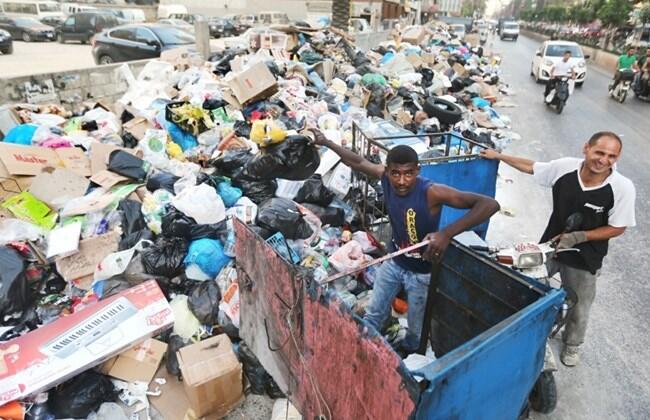Officials remain deadlocked over where to dispose of garbage after the Environment Ministry closed the region’s primary landfill Friday, and citizens decrying government mismanagement demonstrated in Riad al-Solh square, downtown. Environment MinisterMohammad Machnouk warned Tuesday that Mount Lebanon municipalities should immediately cooperate with the government and open disposal grounds or continue to suffocate in waste. “Every area should accept the amount of garbage it can handle,” he said at a joint news conference with Chouf MP Marwan Hamade, head of Parliament’s Environment Committee. “Municipalities are the local administrations in the areas, and it is part of their prerogatives to be responsible for waste-related matters,” he said. “It does not require any new laws.” But only a few municipalities were able or willing to locate suitable grounds, and many around the country refused to receive Beirut’s waste. Hamade said it was a shared responsibility. “It is not appropriate that we, as residents and daily visitors of Beirut, refuse to accept our share of its garbage,” he said. Hamade and Machnouk’s news conference followed an extraordinary Environment Committee meeting to address the crisis. Machnouk had joined the parliamentarians after discussing the problem with Prime Minister Tammam Salam. Beirut MPs will meet Salam Wednesday to discuss the crisis. Future Movement lawmakers called for an emergency Cabinet meeting to locate new disposal sites and apply sanitary and sustainable methods for waste management. In a rebuke of the environment minister, they warned against tasking each district with managing its own waste, saying it would lead to the proliferation of makeshift, unsanitary dumps, which already number 760. Machnouk promised Sunday he would raise the trash crisis at Thursday’s Cabinet session, but it remains unclear whether ministers will address it. The leader of the Free Patriotic Movement, MP Michel Aoun, said the Cabinet’s input was not required. “The Cabinet has already issued decrees on matters of well-being, like waste management, and the relevant ministers can apply the decrees without returning to the Cabinet,” he said. Aoun’s bloc has been obstructing the Cabinet’s agenda since June 5. At his news conference with Hamade, Machnouk laid the responsibility for waste disposal at the foot of municipalities. He said many of the 760 dump sites that exist across Lebanon could be used temporarily to reduce the crisis’ repercussions. He added that most of the 263 villages served by Sukleen, the region’swaste management contractor, have enough space to bury their share of garbage. Sukleen stopped garbage collection Sunday, after running out of storage space in its facilities following the closure of Naameh. The company is continuing to sweep and tidy the region’s proliferating street dumps. Machnouk warned citizens and local authorities against burning garbage, because of the elevated risk of fire during the summer. The minister also said civil society groups had an important role to play in ending the crisis, urging them to exert pressure on municipalities to guarantee full cooperation. Hamade in turn said the main problem is the public’s lack of trust in the government’s plans. However, he said the crisis could have a silver lining, if municipalities would ask households and establishments to start sorting waste, an environmentally conscious practice followed in many developed countries. Sorting allows waste management companies to compost organic material and sell recyclables, vastly reducing the volume of waste. The responsibility currently lies with Sukleen. Meanwhile, in an effort to reduce health hazards and clean roads, the union of municipalities for Beirut’s southern suburbs began collecting piles of trash mounting on streets Tuesday.“Municipalities have started gathering garbage because we have no other solution,” Ziad Waked, mayor of the suburb of Haret Hreik told The Daily Star, adding that all the area’s trash would be gathered by Tuesday night. “We have the ability and capacity to collect the waste,” Waked said. “But the issue now is where to dump the garbage after theNaameh closure.” A meeting for the union of municipalities in Beirut’s southern suburbs assessed possible dumping grounds to receive garbage from the densely populated area. The Khaldeh dump south of Beirut is one option being studied. Other municipalities have also launched similar initiatives to dispose of waste in light of Sukleen’s absence. The municipality of Burj Hammoud, just east of Beirut, is collecting garbage in its own trucks and dumping it in a vacant lot by the sea, Mayor Antranik Meserlian told The Daily Star Monday. “We can bear this for one week at most before the lot fills up,” he said. Nizar HasanPhilip Issa| The Daily Star











